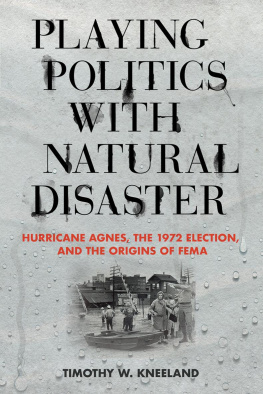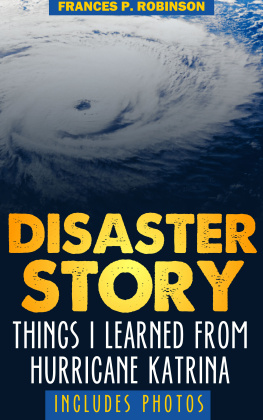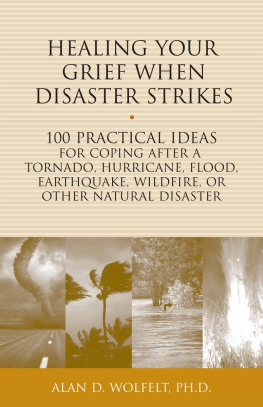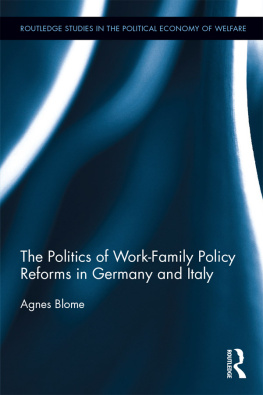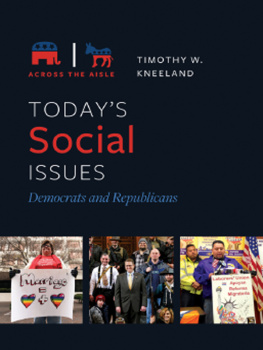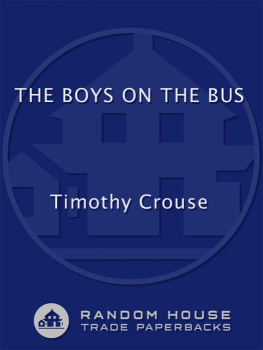PLAYING POLITICS WITH NATURAL DISASTER
Hurricane Agnes, the 1972 Election, and the Origins of FEMA
Timothy W. Kneeland
CORNELL UNIVERSITY PRESSITHACA AND LONDON
For my wife, Laura, and children, Adam, Aaron, Ben, and Anna, who took many trips along the Susquehanna and listened patiently to stories that began, It was 1972 when Hurricane Agnes
Disaster preparedness is a task never completed.
George A. Lincoln
Contents
Preface
The application of history to the task of understanding and analyzing public policy inspired this book, which is a study of Hurricane Agnes and American disaster policy from the top down and the bottom up. Although federal disaster assistance is crucial to mending peoples lives and rebuilding their towns and cities, disasters are local affairs and the rebuilding of shattered communities is overseen and managed by local figures. Even though they are localized, disasters do not occur in a vacuum. Existing policies, political trends, and the administrative power of the federal government impact the response to, and outcome of, any disaster.
When I began this work, I was less sensitive to the importance of the local context of disaster, which is too often neglected in the literature. Nor was I then aware of how significant Richard Nixons response to the disaster would be for national policy making. The location of a disaster, the political context for the timing of the event, and the political influence of local and state officials shaped the federal response to the Agnes disaster in ways I did not realize.
I drew several critical lessons from my study of Hurricane Agnes. First was how unprepared the people and government were for the magnitude of that catastrophe. They were caught off guard even though there was sufficient data available to all involved that a flood in the Susquehanna River Basin, which included Corning, Elmira, Wilkes-Barre, and Harrisburg, was not only likely, but in fact inevitable. Ignoring the history of past floods and relying too heavily on technological solutions promoting the myth that the federal government would warn and protect the public allowed these communities to encourage development along their rivers, which heightened the risk to their properties and their lives. Residents and elected officials relied on the idea that their dams and levees were secure from flooding and that their weather forecasting would provide them with advanced warning of a disaster, neither of which proved correct. Perhaps because they presumed that the government would protect them, they lacked a local agency of first responders that could assist in warning and evacuation in an emergency. They had no plan for recovery after the flooding and no interest in changing the very policies that had put their cities and towns in harms way.
Working on this book from the mid-2000s through 2018 made it clear that some things had not changed since 1972. Time and again the public has been caught unaware or unprepared for devastating events such as Hurricane Katrina in 2005 and the many floods, wildfires, and tornadoes that plagued U.S. society over that decade. As I write this, scientists are predicting that global climate change will increase the likelihood of natural disasters. Although I conclude that as a nation we are much better equipped to deal with disaster than Americans were in 1972, there remains much to be done in terms of regulating the nations floodplain. Individual property owners and their local governments need to rethink how they use their waterfront property in a society that will become wetter and where flooding will become more common. Restricting waterfront development may be a great challenge for local government, but it remains the best hope for protecting lives and property in the future.
This book is the result of the patience, support, and encouragement of librarians and archivists, participants, colleagues, and editors who generously gave their time and talents to assisting in locating material, listening as I thought aloud about it, and making helpful suggestions about the manuscript. In particular, I want to thank the Interlibrary Loan staff at Nazareth College; James Folts and the staff at the New York State Archives, the staff at the Pennsylvania State Archives; Charles Bradley and the staff at the Rockefeller Archives; David Sabo and the staff at the National Archives, which at the time housed the Nixon Presidential Materials Project; Jennie Levine, formerly the Manager of Digital Collections and Research at the McKeldin Library at the University of Maryland, College Park; and Michael Knies, the Special Collections Supervisor at the University of Scranton. More generally, my thanks go to the staff at the Carl A. Kroch Library Division of Rare and Manuscript Collections at Cornell University; the staff at M. E. Grenander Special Collections and Archives at the New York State University at Albany; the librarians at the New York State Library; the staff at the Rochester Public Library, the Buffalo and Erie County Public Library, the Southeast Steuben County Library, the Steele Memorial Library, the Hornell Public Library, and the Osterhout Free Library; and the staff at the Chemung County Historical Society and the Luzerne County Historical Society.
My thanks to Mary Lu Walker and Peter Voorheis for sharing their collection of oral histories and to those who agreed to be interviewed: Robert Rolfe, Joseph Sartori Jr., Thomas Dimitroff, Lois Janes, Donald Roth, Albert Kachik, Lars O. Feese, Michael Mark, Joel Rodney, Marvin Mandel, Amory Houghton, Thomas MacAvoy, Charles Ingraham, G. A. R. Kearney, Myron Gwinner, George Winner, and the late Dorothy and William Smith. My appreciation also goes out to all the people willing to share pictures for the book, including Bonifer Schweizer, the daughter of William and Dorothy Smith; Corning Incorporated the Rakow Research Library of the Corning Museum of Glass; the U.S. Army Corps of Engineers Office of History; the National Weather Service; the National Oceanic and Atmospheric Administration; and the Big Flats Historical Society.
A special thanks goes to Michael McGandy of Cornell University Press who read several versions of this manuscript as it evolved from 2010 until the present and to Thomas Birkland who read the manuscript and made many helpful suggestions. Thanks to colleagues in the Rochester U.S. Historians working group who read and commented on chapters in this book. Finally, a thank-you goes to Laura Kneeland, who patiently read and edited this manuscript.

